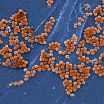In a study released Monday in the Annals of Internal Medicine, Tosteson and colleagues, including lead author Brian Sprague, MD, provide evidence on the benefits and harms of adding ultrasound to breast cancer screening for women who have had a negative mammogram and also have dense breasts. The study will help inform the national legislative discussion about potential regulations requiring health providers to tell women if their mammogram shows that they have dense breasts.
Dense breasts are a risk factor for breast cancer and also make it more difficult to recognize potential problem areas amongst the dense tissue on screening mammograms. Tosteson explained the impact of the research: "Our study is timely because with existing breast density notification laws in some 19 states, and with national legislation pending, it is critical that we understand what approaches to supplemental breast cancer screening are most effective for women with dense breasts."
The study estimates that, for every 10,000 women between the ages of 50-74 with dense breasts who receive supplemental ultrasound screening after a normal mammogram, about four breast cancer deaths would be prevented, but an extra 3,500 biopsies would be given to women who did not have breast cancer.
Tosteson and colleagues used data from the Breast Cancer Surveillance Consortium (BCSC) and three simulation models developed independently within the National Cancer Institute (NCI)-funded Cancer Intervention and Surveillance Modeling Network consortium to evaluate the health outcomes and expense of supplemental screening via ultrasound. Because 40 percent of U.S. women from 40 to 74 years old are estimated to have dense breasts, the value of notifying them of their status and recommending next steps in screening for breast cancer is of national significance.
Tosteson and colleagues recently published a separate simulation modeling study using preliminary data on digital breast tomosynthesis that suggested the new technology may provide an effective way to screen women with dense breasts. Tosteson cautioned that,
"Those projections were based on very limited data from U.S populations and we are expanding these data through our ongoing NCI-sponsored research within the Breast Cancer Surveillance Consortium and the PROSPR (Population-based Research Optimizing Screening through Personalized Regimens) Consortium."
INFORMATION:
Funding for this study was provided by the National Cancer Institute-funded BCSC (P01 CA154292, HHSN261201100031C) and the National Cancer Institute (U01 CA152958, U54 CA163303, and U54 CA163307). The collection of BCSC cancer and vital status data used in this study was supported in part by several state public health departments and cancer registries throughout the United States. For a full description, visit http://breastscreening.cancer.gov/work/acknowledgement.html.
Study authors were Brian L. Sprague, PhD; Natasha K. Stout, PhD; Clyde Schechter, MD, MA; Nicolien T. van Ravesteyn, PhD; Mucahit Cevik, MS; Oguzhan Alagoz, PhD; Christoph I. Lee, MD, MSHS; Jeroen J. van den Broek, MS; Diana L. Miglioretti, PhD; Jeanne S. Mandelblatt, MD, MPH; Harry J. de Koning, MD, PhD; Karla Kerlikowske, MD, MS; Constance D. Lehman, MD, PhD; and Anna N. A. Tosteson, ScD. Collaborators were from the University of Vermont, Burlington, Vermont; Harvard Medical School and Harvard Pilgrim Health Care Institute, Boston, Massachusetts; Albert Einstein School of Medicine, Bronx, New York; Erasmus Medical Center, Rotterdam, the Netherlands; University of Wisconsin-Madison, Wisconsin; University of Washington School of Medicine and Group Health Research Institute, Group Health Cooperative, Seattle, Washington; University of California, Davis School of Medicine, Davis, California; Georgetown University, Washington, DC; University of California, San Francisco, California; and Dartmouth Institute for Health Policy and Clinical Practice and Norris Cotton Cancer Center, Geisel School of Medicine at Dartmouth, Lebanon, New Hampshire.
About the Breast Cancer Surveillance Consortium
The Breast Cancer Surveillance Consortium is the nation's largest and most comprehensive collection of breast cancer screening information. It is a research resource for studies designed to assess the delivery and quality of breast cancer screening and related patient outcomes in the United States. The BCSC is a National Cancer Institute-funded collaborative network of seven mammography registries with linkages to tumor and/or pathology registries, including women from Group Health Cooperative, San Francisco Mammography Registry, Carolina Mammography Registry, Colorado Mammography Project, New Hampshire Mammography Network, New Mexico Mammography Project, and Vermont Breast Cancer Surveillance System. The network is supported by a central Statistical Coordinating Center. For more information, please see http://www.breastscreening.cancer.gov/.
About the Cancer Intervention and Surveillance Modeling Network (CISNET)
The Cancer Intervention and Surveillance Modeling Network (CISNET) is a consortium of National Cancer Institute-sponsored investigators that includes modeling to improve our understanding of the impact of cancer control interventions (e.g., prevention, screening, and treatment) on population trends in incidence and mortality. These models can be used to project future trends and aid in the development of optimal cancer control strategies. Established in 2000 by the National Cancer Institute, CISNET's projects comprise five cancer sites: breast, colorectal, esophagus, lung, and prostate. For more information, please see http://www.cisnet.cancer.gov/.
About the PROSPR Consortium (Population-based Research Optimizing Screening through Personalized Regimens)
The National Cancer Institute (NCI) established PROSPR in September 2011. PROSPR's overall purpose is to promote coordinated, multidisciplinary research to evaluate and improve the cancer screening process for breast, colon, and cervical cancer. For more information, please see http://prosprnetwork.org.
About Norris Cotton Cancer Center at Dartmouth-Hitchcock
Norris Cotton Cancer Center combines advanced cancer research at Dartmouth and the Geisel School of Medicine with patient centered cancer care provided at Dartmouth-Hitchcock Medical Center in Lebanon, NH, at Dartmouth-Hitchcock regional locations in Manchester, Nashua, and Keene, NH, and St. Johnsbury, VT, and at 12 partner hospitals throughout New Hampshire and Vermont. It is one of 41 centers nationwide to earn the National Cancer Institute's "Comprehensive Cancer Center" designation. Learn more about Norris Cotton Cancer Center research, programs, and clinical trials online at cancer.dartmouth.edu.



